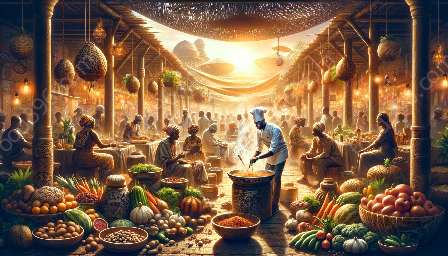Discover the diverse and vibrant world of African cooking techniques, deeply rooted in history and tradition. From the ancient Berbere spice blend of Ethiopia to the open-fire braai grilling tradition of South Africa, African cuisine showcases a wide range of distinct methods and flavors that have evolved over centuries.
Understanding the cooking techniques of Africa requires delving into the rich history and cultural influences that have shaped the continent's culinary landscape. It's a journey that spans thousands of years and encompasses a vast array of indigenous ingredients, tools, and methods, all of which contribute to the uniqueness and richness of African cuisine.
African Cuisine History
The history of African cuisine is as diverse as the continent itself. It is influenced by a myriad of factors, including indigenous traditions, colonial legacies, and foreign influences brought by trade and migration. In many ways, African cuisine serves as a reflection of the continent's rich tapestry of cultures, with each region boasting its own unique culinary heritage.
Traditional African Cooking Techniques
1. Berbere Spice Blend: Originating in Ethiopia, Berbere is a key component of traditional Ethiopian cuisine. This complex blend of spices, including chili peppers, garlic, ginger, and fenugreek, is used to season stews, lentils, and meats. Its fiery yet aromatic flavors make it a distinctive and essential ingredient in Ethiopian cooking.
2. Injera Fermentation: Injera, a sourdough flatbread, is a staple in Ethiopian and Eritrean cuisine. Made from teff flour, it undergoes a unique fermentation process that results in its characteristic tangy flavor and spongy texture. The technique of fermenting teff and cooking injera on a large clay plate is an integral part of Ethiopian cooking traditions.
3. Braai Grilling Tradition: In South Africa, the braai (barbecue) is more than just a method of cooking; it is a social and cultural institution. From succulent steaks and spicy sausages to flavorful seafood, the braai involves grilling meat and other ingredients over an open flame, often accompanied by vibrant marinades and spices that impart a distinct smoky flavor.
African Cooking and Culture
The connection between African cooking techniques and culture runs deep, with culinary practices often intertwined with social, spiritual, and historical significance. Many traditional African recipes are passed down through generations, with cooking and sharing meals being central to communal gatherings and celebrations.
Moreover, the use of specific ingredients, such as grains, tubers, and indigenous plants, reflects the deep connection between African cuisine and the land. Techniques such as pounding, grinding, and fermenting are not only methods of food preparation but also cultural rituals that honor the bounty of the earth.
Evolution and Adaptation
As with any cuisine, African cooking techniques have evolved over time, influenced by historical developments, cross-cultural exchanges, and modern innovations. The impact of globalization and the diaspora has led to the adaptation of traditional methods and the incorporation of new ingredients, creating a dynamic culinary landscape that continues to evolve while preserving its rich historical roots.
In conclusion
The world of African cooking techniques is a testament to the continent's diversity, history, and creativity. From the intricate spice blends of North Africa to the open-fire grilling traditions of the South, each region's unique techniques and flavors reflect a tapestry of cultural influences and gastronomic creativity. Exploring the roots, history, and cultural significance of African cooking provides an enriching journey into the heart and soul of this vibrant and multifaceted cuisine.

